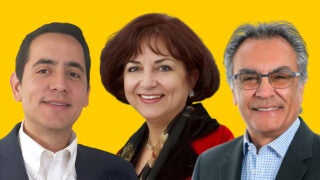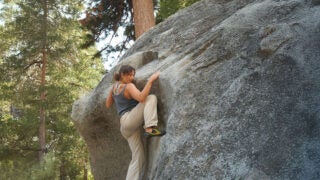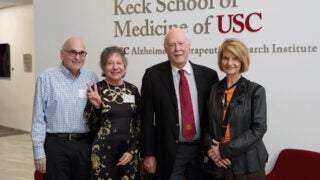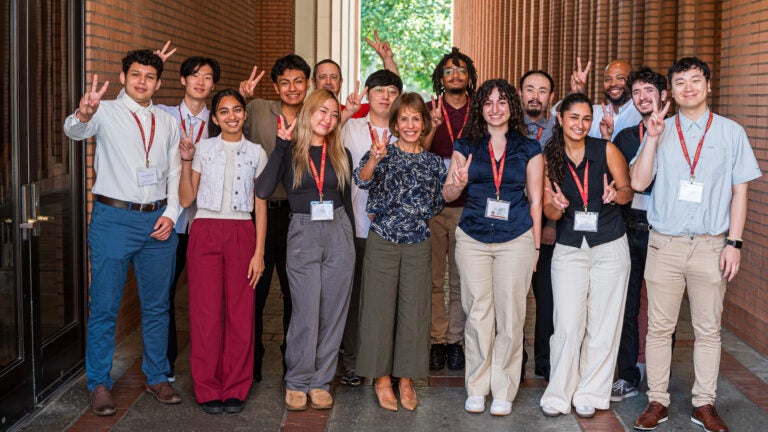
USC President Carol Folt poses with participants in the President’s High-Tech Scholars program. (USC Photo/Sean Dube)
President’s High-Tech Scholars program brings top tech students to USC
Donor support is growing for USC President Carol Folt’s program to recruit community college transfer students in computing and technology.
Camerin Lee, a computer science major at the USC Viterbi School of Engineering, started his junior year this fall. But as a transfer student from a community college, he didn’t really feel like junior.
“Most juniors already have pre-established friends, cliques and associates at school,” the West Los Angeles College transfer and Los Angeles native said.
Fortunately for Lee, a new scholarship program gave him both a social and academic leg up. As part of the inaugural cohort of the President’s High-Tech Scholars program, Lee has a built-in connection to 12 other community-college transfer students in technology and computing, as well as access to specialized counseling, advising and social resources — all designed to ensure that these talented students can smoothly adjust to USC as they prepare to become leaders in tech fields.
“It was just good as a transfer to have some familiar faces on campus,” Lee said. “The program has helped me feel comfortable at USC.”
USC President Carol Folt launched the program last year to support community-college transfer students who are pursuing studies in computing and technology. So far, Folt has raised more than $23 million for the program.
USC: Top destination for transfer students
The President’s High-Tech Scholars program builds on USC’s leading role as a top destination for transfer students, with USC ranking first in transfer enrollment among private research universities in the United States. During the past five years, nearly 30% of all new USC undergraduates were transfer students; in fall 2024, 55% of USC’s new transfer students came from a California community college.
“As a community-college transfer student myself, I have great appreciation for the talent and determination community college transfers bring to universities like USC,” Folt said. “The High-Tech Scholars program expands our efforts to nurture outstanding students and bring them into key areas of technology such as artificial intelligence, machine learning and data science. It’s wonderful that we can offer these opportunities to our transfer students — and USC as a whole benefits from their presence on our campuses.”
Supporting students in tech disciplines furthers two of Folt’s “moonshot” initiatives: Frontiers of Computing, USC’s largest-ever academic initiative, which includes the launch of the USC School of Advanced Computing; and USC Competes, which emphasizes bringing top students and faculty to the university.
Modeled on the successful, nationally recognized Chancellor’s Science Scholars program Folt launched as chancellor of the University of North Carolina at Chapel Hill, the President’s High-Tech Scholars program provides highly customized experiences both inside and outside the classroom to prepare these scholars to address today’s most complex challenges — in business, health, the creative economy, security, sustainability and more, Folt said.
The task of building the program and recruiting that first group of students — all of whom are from schools in the Los Angeles Community College District — began with Thomas C. Freeman, who joined USC in August 2023 as associate vice provost for academic programs and interim director of the High-Tech Scholars program. Freeman previously worked at UNC, where he ran the Chancellor’s Science Scholars program.
Of the 13 students in the first cohort of President’s High-Tech Scholars, nine are enrolled in USC Viterbi and four are in the USC Dornsife College of Letters, Arts and Sciences.
“We brought in an amazing group,” Freeman said. “They’re very accomplished, very ambitious and very excited about being Trojans — a wonderful group to work with.”
Summer Launchpad kickoff for High-Tech Scholars program
The program kicked off in July with the inaugural Summer Launchpad, a four-week residential program to help students adjust to the expectations and environment of USC. In addition to enjoying team-building exercises and mentoring with their two resident advisors — both themselves transfer students at USC Viterbi — the scholars were introduced to such campus resources as the USC Kortschak Center for Learning and Creativity, the USC Annenberg Center for Third Space Thinking, the USC Viterbi Baum Family Maker Space and the USC Student Equity and Inclusion Programs cultural centers, among many more.
The students also took a noncredit writing and design course taught by Katherine Brichacek, a lecturer of technical communication at USC Viterbi, and an artificial intelligence/machine learning workshop series led by Benjamin Nye, director of learning services at the USC Institute for Creative Technology.
“I got my start as an instructor at Harold Washington College in Chicago, so I have a special place in my heart for teaching community college students,” Brichacek said. “As soon as I heard that there was a need to teach a class to these students — a lot of whom were transferring into Viterbi — I was incredibly excited.”
Freeman says the program was set up to build culture and community among the scholars — they even developed a motto for their cohort and had T-shirts printed. “All aspects of the summer program, including courses and team meetings, emphasized ethical responsibility, accountability and integrity,” he said. They also had a chance to enjoy social excursions to the movies, the Natural History Museum of Los Angeles County and Universal Studios Hollywood.
“This opportunity to live on campus and gain a miniaturized version of the freshman experience is something that most community college transfers never get to have,” Freeman said.
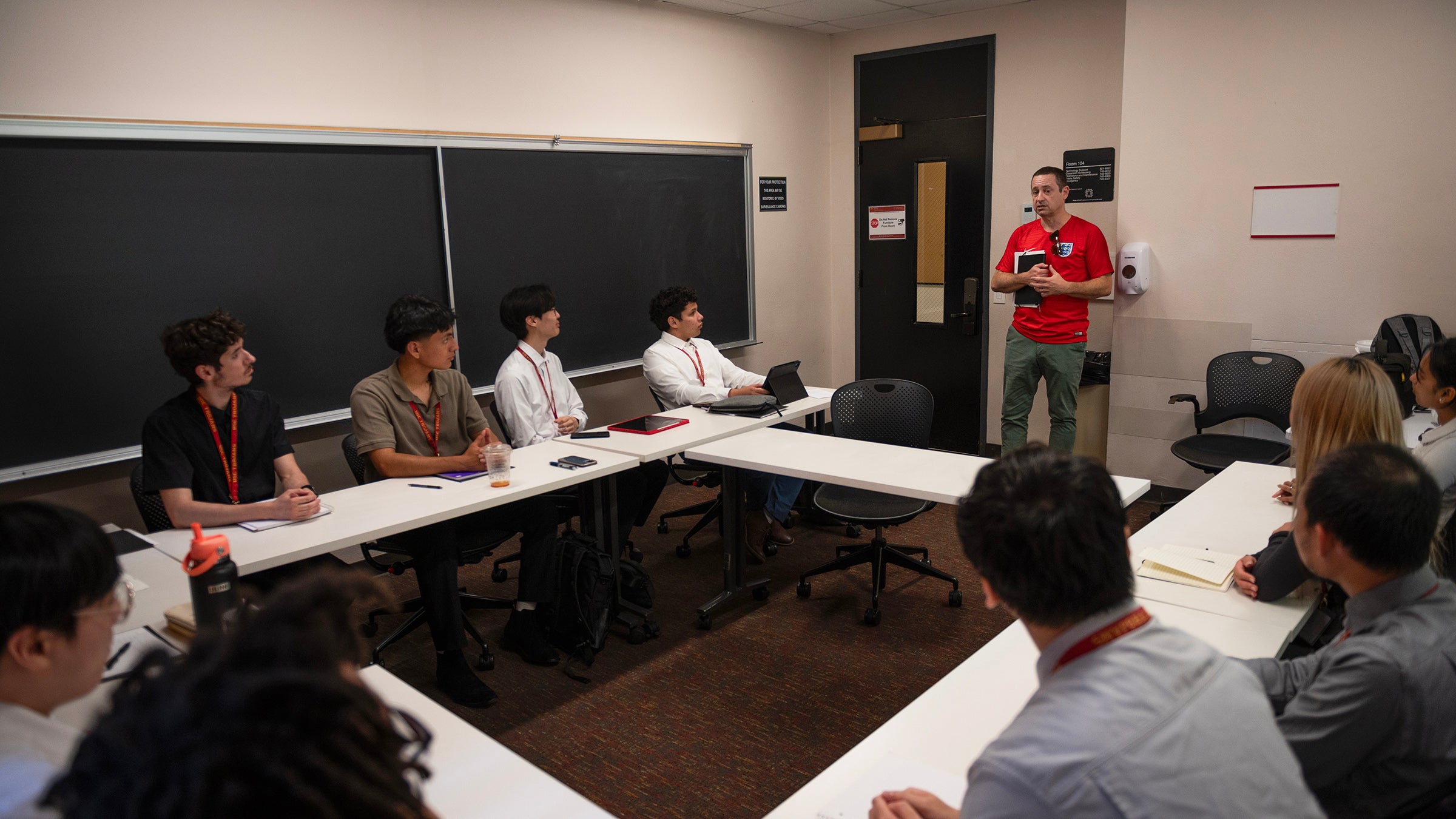
Once the fall semester began, the scholars’ class curriculum focused on advanced computing — including artificial intelligence, machine learning and data science — as well as on issues of ethics and trust. The scholars also maintained their social and mentorship ties to the program and each other, participating in one-on-one meetings with Freeman to assess how they acclimating to USC and holding social gatherings and professional development events, including ice cream socials, coffee hours and workshops.
Alejandra Delacruz Hong became the first permanent director of the President’s High-Tech Scholars program last month. “These transfer students are focused on making an impact, not only for themselves but for their entire community,” Hong said. “They have a heart of service and a passion for making things better as they explore their careers in technology.”
High-Tech Scholars program: Support from the Trojan Family
Both Hong and Freeman note that the program’s initial success was due to the generous support from the Trojan Family. Folt launched the program with initial funding from the Sherman Fairchild Foundation, also allocating additional funds from the Lord Foundation of California gift to USC in support of advanced computing. USC Board of Trustees members Kathy Leventhal and Oscar Munoz have recently lent their support to the program, as well.
Leventhal said she and her husband, Richard, have volunteered with several USC programs, noting the importance of supporting higher education.
“Our legacy is improving the lives of young people by exposing them to experiences and opportunities at a remarkable school where their lives can be forever enhanced,” she said.
“Richard and I are honored to invest in a program that is central to President Folt’s Frontiers of Computing moonshot and one that will change the lives of so many young people,” she said. “We look forward to seeing how this program grows in the coming years.”
Munoz is well-known for his journey from Mexican immigrant to first-generation college student to CEO and chairman of United Airlines. A USC Marshall School of Business alumnus, Munoz was the first in a family of nine to go to college. A high school guidance counselor helped him apply, and supportive friends convinced him he belonged and fostered what Munoz calls “a duty to care.”
A recent, significant gift from Munoz and his wife, Cathy, in support of High-Tech Scholars will help prepare those students for the world that advanced computing is helping to create.
“Envelope-pushing technology, such as AI, is something that must be understood and mastered by every young person who wants to help shape and share in the future,” said Oscar Munoz, who co-founded the nonprofit Pave It Forward with his wife to raise scholarship funds for first-generation students. “If we’re going to lift communities around us, then what better way than to educate them where the jobs are going to be, so they can create value not only for themselves but for the world at large.”
Camerin Lee says that, with the support and resources he’s received from the President’s High-Tech Scholars program, he’s ready for whatever comes next at USC and beyond. “Everyone here is very intelligent,” he noted. “Just to be around this type of environment makes me want to do better.”
The faculty and staff who helped build the program are confident that Lee and his fellow High-Tech Scholars will do just that.
“The program shows that USC values giving students steppingstones to succeed,” Brichacek said. “It can be a difficult transition to feeling like you fit if you came from community college — but the bottom line is, of course you fit, of course you belong.”
USC’s Grayson Schmidt contributed to this story.

